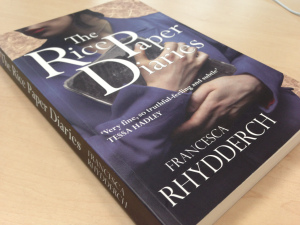 I can’t recommend this beautifully-written novel highly enough. Francesca Rhydderch barely puts a foot wrong as she tells an extraordinary story.
I can’t recommend this beautifully-written novel highly enough. Francesca Rhydderch barely puts a foot wrong as she tells an extraordinary story.
That story is compelling in itself concerned as it is with the experiences of Elsa, a Welsh woman living in wartime Hong Kong when the Japanese invade. It plays out the life-changing effects of interment, infidelity and the difficulty of coming home. Along the way it asks questions about love and family and the competing and completing strands that make up a person’s identity.
But oh, the writing!
Told from four very different perspectives in different sections, Rhydderch tailors the language and imagery of each section so that they take on the personality of the character most clearly in focus. In the section told by the Chinese amah, Lin, the language is bright and vivid, populated by images of insects:
I stood on deck and watched the sun split open over the harbour, spilling light like a silkworm pushing its way out of a cocoon.
And there are other insects: the invading planes fly ‘like squat, gorged mosquitoes’ and the Chinese employees protecting Elsa’s baby Mari hide in a wicker basket which is like a cocoon.
When Elsa’s husband Tommy takes over the narrative in the form of a prison log, the shift is abrupt but his matter of fact descriptions of the way the prisoners adjust to a hellish existence (committees, rotas) bristle beneath the surface with anger and violence, suitably expressed in more aggressive language. So when he describes a sunrise, it’s very different to the fragile beauty of Lin’s version:
The sun rises furiously in the sky, grabbing the day by its throat.
Rhydderch uses similarly appropriate words and imagery in the section telling Mari’s story. As her parents argue, it seems to the young Mari that they’re
talking in sharp bursts of words that sounded like marbles crashing against each other before rolling away into angry silences.
And,
She keeps her eyes wide open for so long that when she finally blinks her eyelids are flecked with ghosts rearing out of the soil.
As I say, I can’t recommend ‘The Rice Paper Diaries’ highly enough. It’s a rich and satisfying read and hopefully the first of many great novels from Francesca Rhydderch.